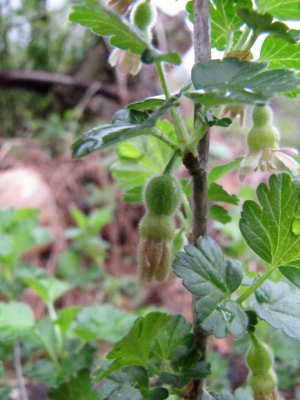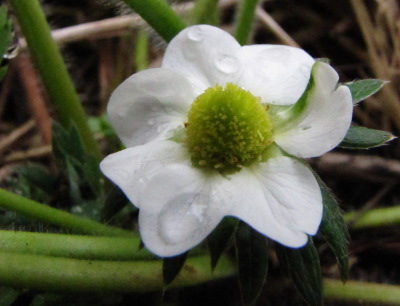
Don't neglect small fruits
 In
the long run, tree fruits are the least work for the most food, but
they also take so darn long to produce! Due to a couple of years
learning about how to
plant trees in our waterlogged clay soil, we only ate our first tree
fruits --- peaches --- last summer. This year, we'll have more
peaches and maybe a pear, but it could be another couple of years
before we taste a homegrown apple.
In
the long run, tree fruits are the least work for the most food, but
they also take so darn long to produce! Due to a couple of years
learning about how to
plant trees in our waterlogged clay soil, we only ate our first tree
fruits --- peaches --- last summer. This year, we'll have more
peaches and maybe a pear, but it could be another couple of years
before we taste a homegrown apple.
Meanwhile, we've been
eating strawberries since our second year on the farm (and could have
eaten them less than a year after planting if we'd set
them out in late summer.) Our everbearing
red raspberry
fruited the first year we had it in the ground, and has since colonized
two more garden rows and our rabbiteye
blueberries also had a handful of fruits the first year. Thornless
blackberries fruited
copiously starting the second year and grapes had a few fruits the
first year (if you don't count the year they grew in the garden as hardwood
cuttings.) If
the photo above is any indication, it looks like our new gooseberries are going to be fruiting the
second year after planting too (which is a bit surprising since I put
them in the ground later than I should have and they had a hard summer.)
 Which is all a long way of
saying --- don't put all of your fruit eggs in the tree basket.
Planting a few small fruits in your garden the first year ---
especially brambles and strawberries --- is a great way to keep
yourself from going crazy waiting for that apple tree to slowly
mature. (And, yes, this post really is just an excuse to show off
my strawberry and gooseberry flowers.)
Which is all a long way of
saying --- don't put all of your fruit eggs in the tree basket.
Planting a few small fruits in your garden the first year ---
especially brambles and strawberries --- is a great way to keep
yourself from going crazy waiting for that apple tree to slowly
mature. (And, yes, this post really is just an excuse to show off
my strawberry and gooseberry flowers.)
Want more in-depth information? Browse through our books.
Or explore more posts by date or by subject.
About us: Anna Hess and Mark Hamilton spent over a decade living self-sufficiently in the mountains of Virginia before moving north to start over from scratch in the foothills of Ohio. They've experimented with permaculture, no-till gardening, trailersteading, home-based microbusinesses and much more, writing about their adventures in both blogs and books.
Want to be notified when new comments are posted on this page? Click on the RSS button after you add a comment to subscribe to the comment feed, or simply check the box beside "email replies to me" while writing your comment.

I tend to prefer berries to tree fruits. Strawberries also have the advantage of being small enough to grow in a hanging basket, making them the perfect fruit for renters and others without a patch of soil to dig up.
Also, don't forget melons! Some of my favorite fruits belong to the melon family.
Dean --- That's the reason I plant strawberries in mid-summer now. If you do that, they get enough growth in the first fall that you don't have to pick off the blooms the next spring (which is heart-wrenching!) Good luck with your strawberry pot!
Edward --- Great point with the melons! We seem to have a tough time growing them in our humid climate, but if you can pull it off, they will give you fruit in just a few months.
Melons are tough in damp places --- they're just so prone to molds. We've had the best luck with Sugar Baby watermelons --- they seem to be more resistant, and the fruits are small enough that you get some before the vines keel over.
I highly recommend everbearing raspberries --- they're the most copious fruiters (except for strawberries) in our small fruit garden at the moment. Of course, blueberries will grow into high production, but they're nearly as slow as trees....